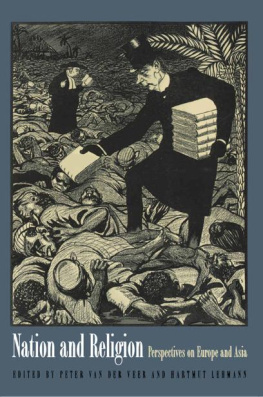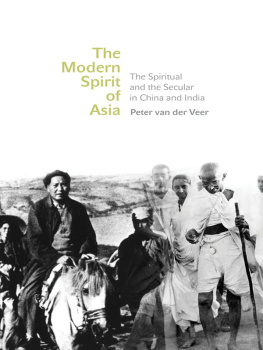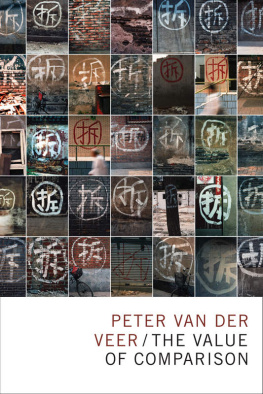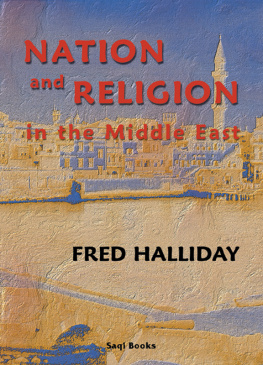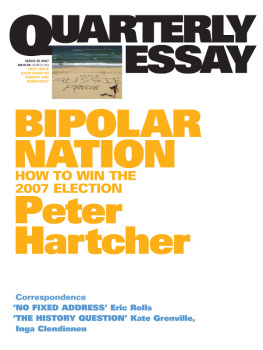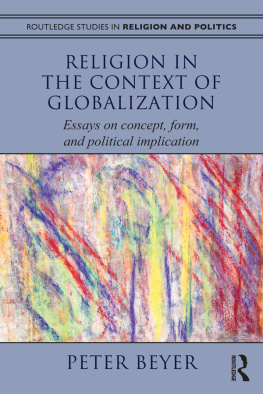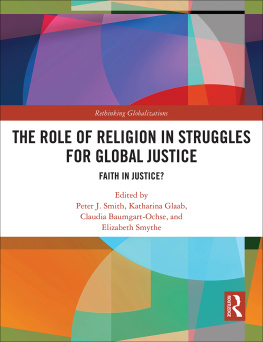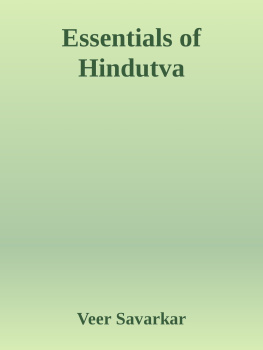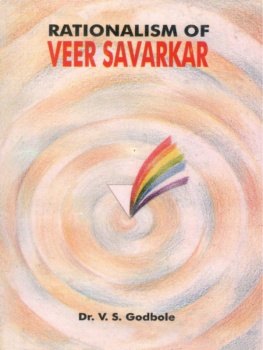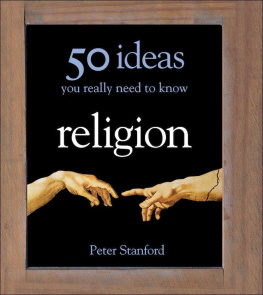Peter van der Veer - Nation and Religion
Here you can read online Peter van der Veer - Nation and Religion full text of the book (entire story) in english for free. Download pdf and epub, get meaning, cover and reviews about this ebook. year: 2020, publisher: Princeton University Press, genre: Religion. Description of the work, (preface) as well as reviews are available. Best literature library LitArk.com created for fans of good reading and offers a wide selection of genres:
Romance novel
Science fiction
Adventure
Detective
Science
History
Home and family
Prose
Art
Politics
Computer
Non-fiction
Religion
Business
Children
Humor
Choose a favorite category and find really read worthwhile books. Enjoy immersion in the world of imagination, feel the emotions of the characters or learn something new for yourself, make an fascinating discovery.
- Book:Nation and Religion
- Author:
- Publisher:Princeton University Press
- Genre:
- Year:2020
- Rating:3 / 5
- Favourites:Add to favourites
- Your mark:
- 60
- 1
- 2
- 3
- 4
- 5
Nation and Religion: summary, description and annotation
We offer to read an annotation, description, summary or preface (depends on what the author of the book "Nation and Religion" wrote himself). If you haven't found the necessary information about the book — write in the comments, we will try to find it.
Nation and Religion — read online for free the complete book (whole text) full work
Below is the text of the book, divided by pages. System saving the place of the last page read, allows you to conveniently read the book "Nation and Religion" online for free, without having to search again every time where you left off. Put a bookmark, and you can go to the page where you finished reading at any time.
Font size:
Interval:
Bookmark:
NATION AND RELIGION
NATION AND RELIGION
PERSPECTIVES ON EUROPE AND ASIA
Edited by
Peter van der Veer and Hartmut Lehmann
PRINCETON UNIVERSITY PRESS PRINCETON, NEW JERSEY
Copyright 1999 by Princeton University Press
Published by Princeton University Press, 41 William Street,
Princeton, New Jersey 08540
In the United Kingdom: Princeton University Press,
Chichester, West Sussex
All Rights Reserved
Library of Congress Cataloging-in-Publication Data
Nation and religion: perspectives on Europe and Asia / edited by Peter van der Veer and Hartmut Lehmann.
p. cm.
ISBN 0-691-01233-4 (cl: alk. paper). ISBN 0-691-01232-6 (pb: alk. paper)
eISBN 978-0-691-21957-8
1. Religion and stateComparative studies. 2. NationalismReligious aspectsComparative studies. I. Veer, Peter van der. II. Lehmann, Hartmut.
BL65.S8N36 1999
322.109dc216 98-40357 CIP
http://pup.princeton.edu
R0
Contents _________________________
vii
Acknowledgments _________________________
THIS BOOK is the product of a conference on Religion and Nationalism in Europe and Asia, organized by the Research Centre for Religion and Society, Amsterdam, and the Max-Planck-Institut fr Geschichte, Gttingen, which was held at the University of Amsterdam, 2729 November 1995. It received financial support from the Max-Planck-Institut fr Geschichte, the International Institute for Asian Studies, the Royal Dutch Academy of Sciences, and The Netherlands Foundation for Scientific Research, for which we are truly grateful. We want to express our thanks to our colleagues Alf Ldtke and Peter van Rooden for their organizational and intellectual contributions to the shaping of this conference. We also thank Ingrid van der Broek and Jasper Klapwijk for their attention to the preparation of the manuscript. Finally, we owe special thanks to Mary Murrell and the staff of Princeton University Press for their strong support of this project.
Harmut Lehmann
Peter van der Veer
NATION AND RELIGION
_________________________
Introduction
PETER VAN DER VEER AND HARTMUT LEHMANN
THANKS TO Benedict Andersons influential book on the topic, it has become almost a clich to suggest that the nation is an imagined community.
The dichotomy between religion and nationalism is an ideological element in the Western discourse of modernity. Based partly on this philosophical notion of the rationality of the West is the current but much less sophisticated idea that Western Europe and the United States have had a unique historical experience of secularization, whereas Asia (and South Asia in particular) has had a history of dangerous politicization of religious difference. This impression is plainly wrong, since it perpetuates the old, mistaken view of the great divide between the modern West and the backward Rest. The present collection of essays on both the Western European (that is, British and Dutch) and the Asian (that is, Indian and Japanese) historical experience problematizes the understanding of Western modernity and its function as a model for the rest of the world.
It is important to realize that both nation and religion are conceptualized as universal categories in Western modernity and that their universality is located precisely in the history of Western expansion. The modernity of the concept of the nation needs little discussion beyond mentioning the relationship between the ideas of nation and ethnicity as raised by the reference to birth in the very word nation. The modernity of the concept of religion, as applied in the modern era to Hinduism, Shintoism, Islam, but also Christianity, is much less an accepted truism in the social sciences.
In a recent critical reflection on Clifford Geertzs celebrated ahistorical and universal definition of religion, Talal Asad argues that it ignores the genealogy of the modern Western understanding of religion.
This situation does not have to force us into an epistemological hypochondria, to use the Comaroffs phrase. It asks for a social and comparative history of religion with an emphasis on the social conditions of particular discourses and practices. Only through historical analysis can one deconstruct the commonplace dichotomy of a supposedly secular and modern West and a religious and backward Rest. The location of religion in the modern world should, in our view, be addressed in relation to the historical emergence of the modern idea of the nation and its spread over the world.
Let us briefly recapitulate the accepted social science view of nationalism and its relation to religion. The emergence of the European nation-state is commonly seen to depend on three connected processes of centralization: the emergence of supra-local identities and cultures (the nation); the rise of powerful and authoritative institutions within the public domain (the state), and the development of particular ways of organizing production and consumption (the economy). Nationalism comes thus in a package with individualism and secularism, as required by the industrial transformation of an agrarian world.
It is plausible, of course, that there are significant relations between the emergence of an industrial economy and the gradual homogenization of culture through a state-controlled education system, but Gellner exaggerates the universal success of homogenization and simplifies its nature. His argument subsumes a variety of local histories under the mechanical laws of a universal history, and it is doomed to analytical defeat in the face of any nationalism that is religious rather than secular. The history told by Gellner unfolds itself independent of human agency. It is the story of the victory of a fetishized historical force, capitalism, which celebrates objective imperatives and ignores meaningful and innovative action by individuals and groups who make history in everyday practices. Gellner pays little attention to the contradictions of homogenization as well as the forms of resistance that it meets. The basic flaw in the modernization theory he espouses, as well as in many Marxist analyses of the expansion of capitalism, is the assumption that a common, shared culture (or ideology) is necessary to integrate the social system. While it can be seen that the social constraints of the division of labor as well as the physical constraints of political force produce to some extent what we can call social order, there is no need to assume (and plentiful evidence against) the assumption that social order depends on common culture and moral consensus.
One reason for the influence of texts that universalize the modernization of Western Europeand those by Anderson and Hobsbawm are not different from Gellners in this respectis that they stylize a picture of nationalism typical not only for social theory but for an entire commonsensical way of thinking. Crucial is the way in which the nation-state is presented as the sign of modernity. The discussion of nationalism concludes, predictably, with its own axiomatic dichotomy between traditional and modern. Tradition is what societies have before they are touched by the great transformation of capitalism, and what seems to characterize traditional societies most is that they are under the sway of religion.
Much of the writing on modernity and modernization in the social sciences has been inspired by Max Weber, who in the first two decades of this century published his famous treatises on the role of religious and political as well as social and economic factors in the processes of modernization. Nationalism, however, was not one of the forces he discussed. This omission was not unusual, but indeed a position taken by many other scholars, by Webers contemporaries, and by the generation that followed. With few exceptions and for many years, the debates about the relationship of modern nationalism and the modern state have ignored the role of religion. On one hand are studies that examine the ways in which the idea of chosenness served to underscore and justify imperialistic political aims and actions; on the other hand, the same notion has been used to explain suffering and to provide a stimulus for political emancipation and national liberation. In both variations chosenness can be blended with ideas of racial purity and uniqueness: the men who believed that they carried a special burden in late-nineteenth-century British colonial affairs were very consciously both Christian and white, and so were their counterparts in countries like the Netherlands, Germany, or the United States.
Next pageFont size:
Interval:
Bookmark:
Similar books «Nation and Religion»
Look at similar books to Nation and Religion. We have selected literature similar in name and meaning in the hope of providing readers with more options to find new, interesting, not yet read works.
Discussion, reviews of the book Nation and Religion and just readers' own opinions. Leave your comments, write what you think about the work, its meaning or the main characters. Specify what exactly you liked and what you didn't like, and why you think so.

